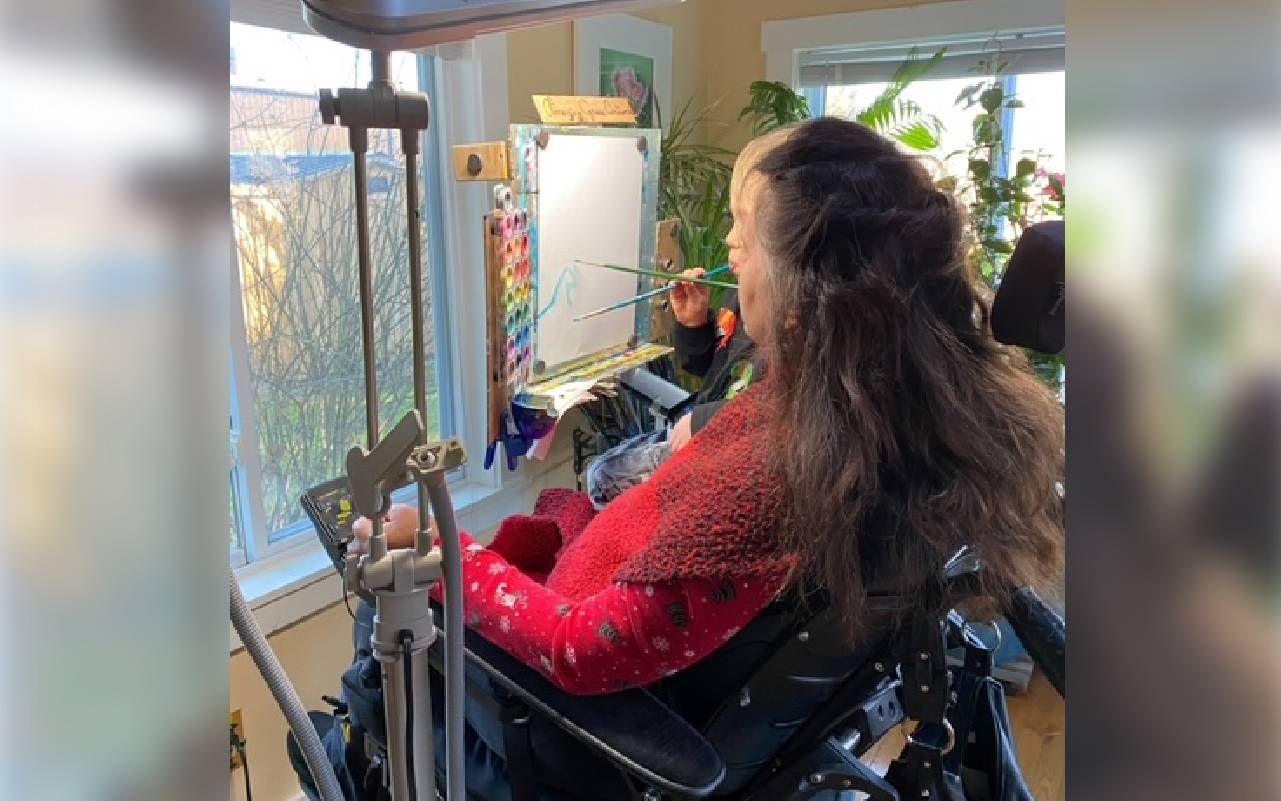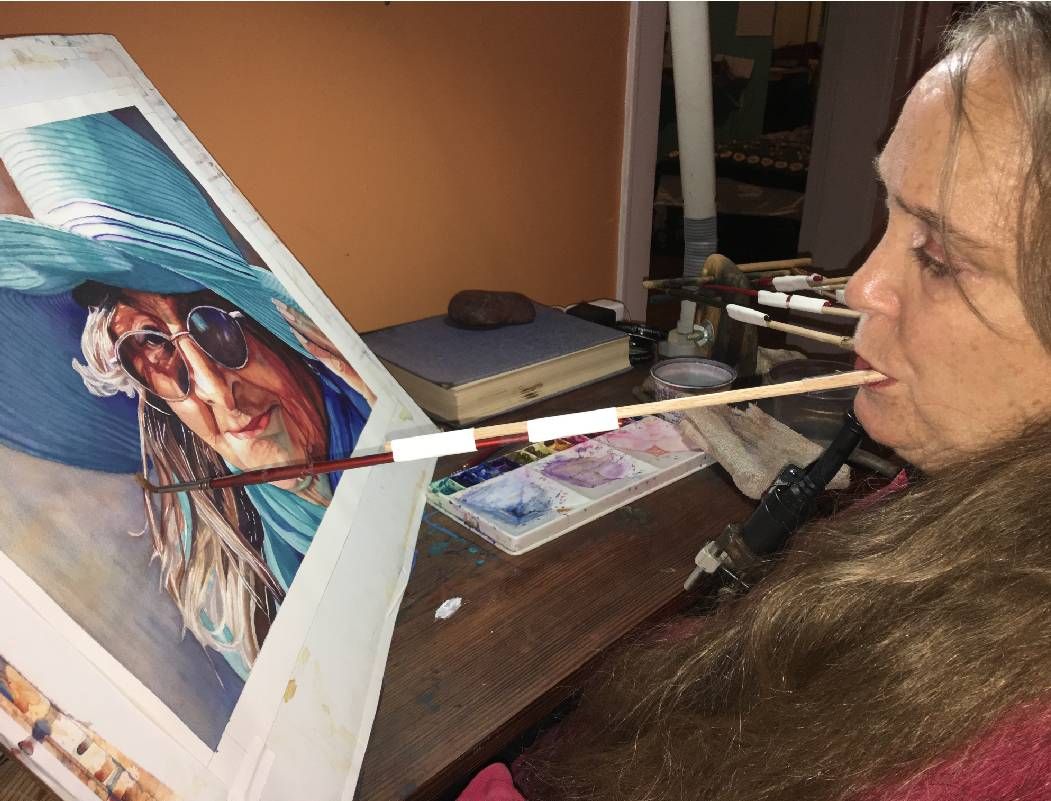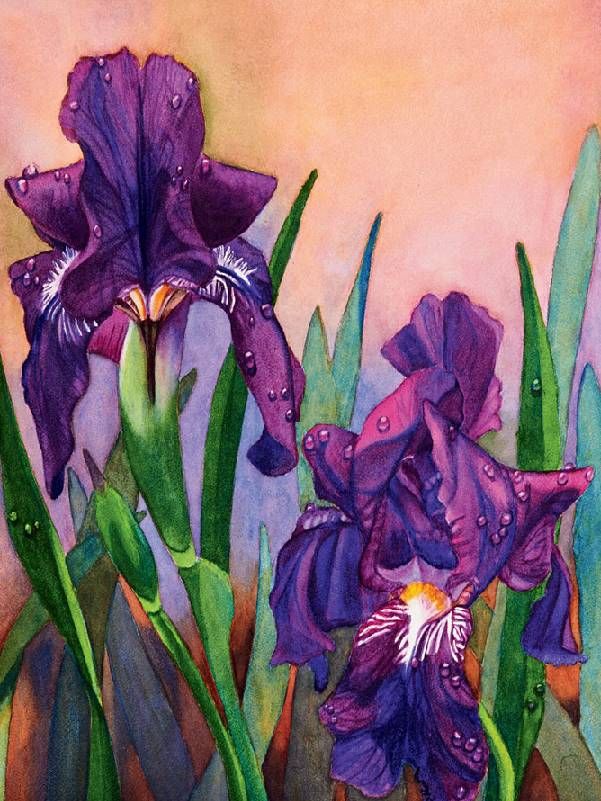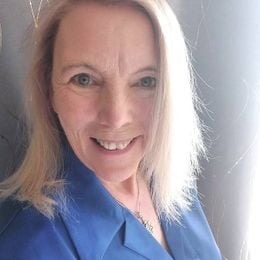Finding Independence With Their Art
Artists living with a disability thrive on creativity, thanks to the guidance and support of the Mouth and Foot Painting Artists organization
In 2000, Nancy Hall and her then-husband were involved in a motorcycle accident that resulted in her becoming paralyzed from the neck down. Her marriage did not survive after the accident, but she did.

Hall, now 54, was active in her community of East Aurora, New York, and involved with her five children and their school activities. Her youngest daughter was ready to begin kindergarten, and Hall needed to fill out school entrance papers. She learned how to sign her name holding a pen in her mouth, but she wanted to do more with her children. Her eldest son, then 15, and her father helped her create a device that held her paper in front and close enough that she could paint by mouth.
Her eldest son, then 15, and her father helped her create a device that held her paper in front and close enough that she could paint by mouth.
"I would paint with watercolor while the kids were coloring. I started to enjoy it and realized that it was something I could do independently," Hall says. "It was so therapeutic."
'Self Help, Not Charity'
She eventually began to make and sell note cards for craft shows. A girlfriend told her about Mouth and Foot Painting Artists (MFPA), an organization that helps qualified artists sell their work in the form of reproductions such as calendars and greeting cards.
MFPA, located in the United States, is a member of a larger group, the International Association of Mouth and Foot Painting Artists. Their tagline is "Self Help, Not Charity." According to the organization's website, MFPA offers three levels of support – student member, associated member and full member – and markets and promotes the work of its artists.
Sara Jane Parsons, 59, is also a member of MFPA. The Austin, Texas artist was artistic prior to the car accident that left her quadriplegic.
"When I was still in occupational therapy, I was excited to just write my initials. I spent the whole therapy session with a marker in my mouth, writing my initials over and over," says Parsons. "It was so exciting to see that I could do something, and I started stenciling."

Discovering a Community of Artists
Parsons went on to law school, and an attendant encouraged her to continue painting after seeing her work. "I started my last semester in law school and started painting the sunflowers in my garden. My brain was starved. I needed a creative outlet," she says.
"My brain was starved. I needed a creative outlet."
She stopped working as a lawyer and moved to Austin for a change of pace. That was when Parsons discovered a love for figure painting, and she joined several watercolor groups in the area. "I wanted my art to be taken seriously as art," she says, "not just 'pretty good because you did it with your mouth.'"
Parsons eventually applied to MFPA and found more than she expected. Although she had friends with disabilities who were artists, she did not know any other mouth painters.
"The support that I receive from MFPA allows me to live independently in my own home, to pay my attendants a decent wage," says Parsons. "I have financial support to travel to art shows, meet other artists who are painting in the same way I am, and I can ask professional colleagues about their work. I can ask them; how do you do this work? How do you manage? How do you paint so large? The community that I am a part of now is amazing. It gives me purpose."
The original organization began in 1957 when painter and polio survivor Erich Stegmann formed a self-help organization with other artists with disabilities from several European countries. Stegmann had a successful career as a mouth painter, and he believed that an organized cooperative would help artists financially and allow them to continue their artistic path. He was adamant about the organization supporting self-help without charity or pity.
Opportunities for Success
Today, the organization has approximately 800 members in more than 70 countries. Both Hall and Parsons find not only financial relief through the programs MFPA offers, but also a sense of community, encouragement and support that allows opportunities for them to succeed.
"I still look at things in my file and say, 'I can't believe I did that.'"
Hall's student scholarship allowed her to find an art teacher, pay for supplies and for classes. "I didn't know anything about color theory or drawing, I was painting on copy paper with discount store paints and paintbrushes. Now as a student, I can paint with good watercolors and acrylic paint," says Hall.
Hall, who is also a member of the Arts and Craftsmen Guild on the Roycroft campus in East Aurora, sends a minimum of seven pieces of art to MFPA annually and is able to sell her original work as she wishes. MFPA owns rights to the images for reproductions in calendars, cards and other work.

"I am independent, and I can give back to others in a way that brings beauty to myself," Hall says. "I find the more I help people, the fewer problems I have. I raised five kids as a single mother, paralyzed. I am blessed beyond comprehension with my children. MFPA opened a door for me, to be able to do things that I was unable to do."
"Art is amazing. It's a meditation," says Parsons. "Even if someone thinks they can't draw or paint, it doesn't matter. Create something that makes you feel good. I still look at things in my file and say, 'I can't believe I did that."
She adds, "Find something that gives you joy, that makes you get out of bed in the morning, that takes you to new places and is something to forward to. I feel that even as you lose things as you age, you might surprise yourself when you try something new."


